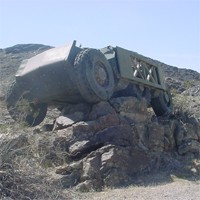Unmanned Ground Combat Vehicle (UGCV)

The UGCV Program will develop vehicle prototypes exhibiting advanced performance in endurance, obstacle negotiation, and transportability (small size) based on novel designs unrestrained by the need to accommodate human crews. The reduced sizes associated with neglecting crew related requirements will enable significantly higher payload fractions and associated deployability for the Future Combat System (FCS). DARPA and the Army evaluated designs against three primary metrics:
- endurance (14 day missions; 450 km range w/o refueling)
- obstacle detection (positive, negative, off-road), and
- payload fraction (>25%).
The UGCV team designed an innovative unmanned vehicle, “Spinner”, that couples extreme terrainability with fuel efficiency, survivability and weapons payload flexibility to deliver the long-range capability required by UGCV missions. Spinner is a highly durable, invertible, 6WD vehicle that responds to the need of a UGCV to surmount challenging terrain obstacles, be easily teleoperated, and withstand an occasional moderate crash and rapidly recover. Spinner exploits the uncrewed aspect by enabling inversion and maintaining a low profile. In addition to rollover crash survivability, the hull, suspension and wheels have been designed for extreme frontal impacts from striking a tree, rock or unseen ditch at speed. Signature and survivability have permeated our entire design exemplified by the vehicle’s low profile, liquid cooling, quiet and cool turbine and careful air management within a sealed hull. Transport is eased by low height and ability of the vehicles to climb one another and self-stack in a cargo bay. Spinner’s rough and tumble capability will ease all forms of logistics, transport and deployment. Once on the ground, its flexibility and nimbleness make it very suitable to the fast-changing FCS operational tactics and missions.
past head
- John Bares
past staff
- Mark Sibenac
past contact
- John Bares